
Superb lead performances and a production design that looks as if it were designed with A Streetcar Named Desire in mind make Inland Valley Repertory Theatre’s revival of the 1947 Tennessee Williams classic one of the company’s best productions ever.
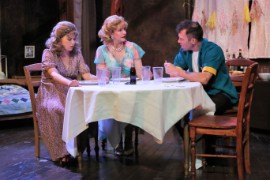 Anyone who’s seen Streetcar’s 1951 screen adaptation with Vivien Leigh’s troubled Blanche DuBois disrupting the lives of her younger sister Stella and Stella’s sexy brute of a husband knows what to expect when Blanche (Susannah Hough) shows up at the cramped New Orleans flat that Stella (Jessica Kochu) and Stanley Kowalski (Aaron Pyle) call home.
Anyone who’s seen Streetcar’s 1951 screen adaptation with Vivien Leigh’s troubled Blanche DuBois disrupting the lives of her younger sister Stella and Stella’s sexy brute of a husband knows what to expect when Blanche (Susannah Hough) shows up at the cramped New Orleans flat that Stella (Jessica Kochu) and Stanley Kowalski (Aaron Pyle) call home.
 They know that despite schoolteacher Blanche’s claims that she’s simply “lost” the DuBois family home and that a case of frazzled nerves has prompted a leave of absence from her job, what Blanche claims and what is indeed the case may not be one and the same.
They know that despite schoolteacher Blanche’s claims that she’s simply “lost” the DuBois family home and that a case of frazzled nerves has prompted a leave of absence from her job, what Blanche claims and what is indeed the case may not be one and the same.
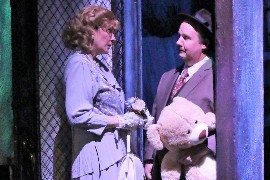 They know that Stanley’s poker buddy Harold “Mitch” Mitchell (Michael Buczynski) will fall under Blanche’s ladylike spell and maybe even into her not-so-ladylike clutches.
They know that Stanley’s poker buddy Harold “Mitch” Mitchell (Michael Buczynski) will fall under Blanche’s ladylike spell and maybe even into her not-so-ladylike clutches.
They know that behind the elder DuBois sister’s prim and proper exterior lurks the most lascivious of natures. (Just ask the young, young, young, young bill collector who shows up at the Kowalski’s doorstep what it feels to have Blanche undress you with her eyes.)
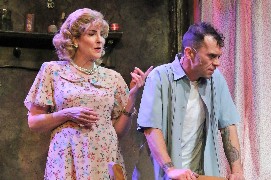 They know, as audiences attending Streetcar’s December 3, 1947 Broadway opening could scarcely have anticipated, that the writer who only three years earlier had achieved fame and renown with his misty water-colored memory play The Glass Menagerie had something far rawer up his sleeve the second time round.
They know, as audiences attending Streetcar’s December 3, 1947 Broadway opening could scarcely have anticipated, that the writer who only three years earlier had achieved fame and renown with his misty water-colored memory play The Glass Menagerie had something far rawer up his sleeve the second time round.
At first glance, A Streetcar Named Desire might seem a daring choice for a theater company whose previous play revivals have included the light and frothy Auntie Mame, Arsenic And Old Lace, and Born Yesterday.
Not only that, but for a company that produces its midweek plays and musicals on sets designed for Candlelight Pavilion Dinner Theatre’s weekend offerings, staging Streetcar on a Little Shop Of Horrors set might be equally challenging.
Fortunately for doubting Thomases. both fears prove unwarrented.
To begin with, director Frank Minano has elicited four absolutely masterful lead performances.
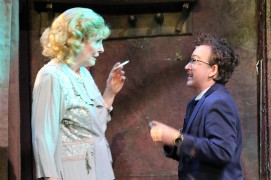 The statuesque, imposing figure Hough cuts when Blanche makes her first entrance may appear the diametric opposite of the movie’s delicate, willowy Miss DuBois, but the Claremont returnee’s heartbreaking Blanche proves just as frail and vulnerable a soul, and height works very much to Hough’s advantage when Blanche pounces upon the aforementioned young, young, young, young man (an amusingly cowed James Peloquin), a bespectacled imp whom she’d clearly like to ravish with more than just her baby blues.
The statuesque, imposing figure Hough cuts when Blanche makes her first entrance may appear the diametric opposite of the movie’s delicate, willowy Miss DuBois, but the Claremont returnee’s heartbreaking Blanche proves just as frail and vulnerable a soul, and height works very much to Hough’s advantage when Blanche pounces upon the aforementioned young, young, young, young man (an amusingly cowed James Peloquin), a bespectacled imp whom she’d clearly like to ravish with more than just her baby blues.
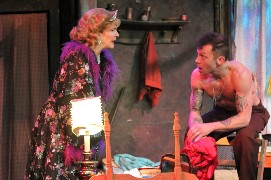 Tattooed, six-packed, and feral, Pyle’s brutish Stanley reveals unexpected intelligence and vulnerability; Kochu not only makes Stella the kindest, loveliest, and most forgiving of creatures, she and Hough look like they could actually be sisters; and Buczynski gives us a salt-of-the-earth Mitch so blindly smitten with Blanche, our hearts ache for him.
Tattooed, six-packed, and feral, Pyle’s brutish Stanley reveals unexpected intelligence and vulnerability; Kochu not only makes Stella the kindest, loveliest, and most forgiving of creatures, she and Hough look like they could actually be sisters; and Buczynski gives us a salt-of-the-earth Mitch so blindly smitten with Blanche, our hearts ache for him.
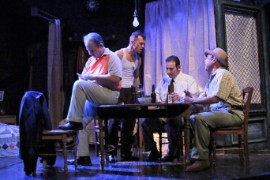 Hector Castaneda (Pablo), Steve Siegel (Steve), and Michelle Knight Reinhardt (Eunice) deliver effective featured performances as Stanley’s poker pals and Steve’s wife Eunice, with Candida Celaya, Jack Freedman, and Zee Manning serving as ambiance-setting background players and Gloria Anderson and George Waters showing up at the end to give Blanche a reason to extol “the kindness of strangers.”
Hector Castaneda (Pablo), Steve Siegel (Steve), and Michelle Knight Reinhardt (Eunice) deliver effective featured performances as Stanley’s poker pals and Steve’s wife Eunice, with Candida Celaya, Jack Freedman, and Zee Manning serving as ambiance-setting background players and Gloria Anderson and George Waters showing up at the end to give Blanche a reason to extol “the kindness of strangers.”
 Though the Theatre Company’s costumes can’t seem to make up their mind if it’s the 1930s or ‘40s, a confusion added to by Kirklyn Robinson’s 1950s wigs, Mark Mackenzie has so expertly adapted the Little Shop set that the Skid Row flower shop and its painted street-scene backdrop scrims might very well have been designed for Streetcar, Caleb Shiba’s evocative lighting is nothing short of stunning, Gus Gonzalez delivers an expert sound design mix and effects, and Freedman provides plenty of apt props.
Though the Theatre Company’s costumes can’t seem to make up their mind if it’s the 1930s or ‘40s, a confusion added to by Kirklyn Robinson’s 1950s wigs, Mark Mackenzie has so expertly adapted the Little Shop set that the Skid Row flower shop and its painted street-scene backdrop scrims might very well have been designed for Streetcar, Caleb Shiba’s evocative lighting is nothing short of stunning, Gus Gonzalez delivers an expert sound design mix and effects, and Freedman provides plenty of apt props.
Last but not least, Patrick Brien merits kudos for some realistic fight direction.
Hope Kaufman is assistant director. Bobby Collins is production manager. Andrea John-Lueken is honorary producer.
Inland Valley Repertory Theatre may have taken on more than a bit of a challenge when programming A Streetcar Named Desire as their 2020 season opener, but it’s one they’ve more than met. Tennessee Williams fans should not hesitate to board this Streetcar.
Inland Valley Repertory Theatre at Candlelight Pavilion, 455 W. Foothill Blvd., Claremont.
www.IVRT.org
–Steven Stanley
March 4, 2020
Photos: DawnEllen Ferry
Tags: Inland Valley Repertory Theatre, Los Angeles Theater Review, Tennessee Williams



 Since 2007, Steven Stanley's StageSceneLA.com has spotlighted the best in Southern California theater via reviews, interviews, and its annual StageSceneLA Scenies.
Since 2007, Steven Stanley's StageSceneLA.com has spotlighted the best in Southern California theater via reviews, interviews, and its annual StageSceneLA Scenies.







 COPYRIGHT 2024 STEVEN STANLEY :: DESIGN BY
COPYRIGHT 2024 STEVEN STANLEY :: DESIGN BY